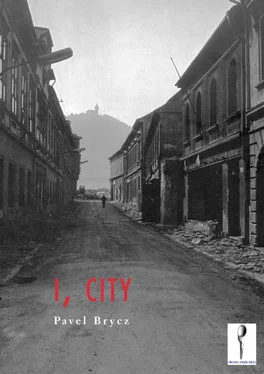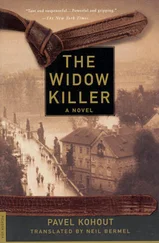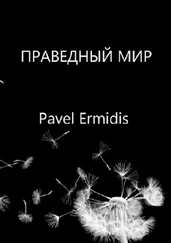chemical plant : built in nearby Záluží, part of the Hermann Goering Werke.
Blues Bouillon : a local band and a reference to the tradition of giving out goulash at campaign rallies.
war in the bay : the Yugoslav Wars of the 1990s.
Without the firing of a single shot : referring to the relatively peaceful dissolution of communism in Eastern Europe, particularly Czechsolovakia’s Velvet Revolution in 1989.
Vlastimil Harapes : Czech dancer, choreographer, and actor, born 1946.
Winterhilfe : literally “Winter-help,” the Winter Relief Program of the Nazi Party, founded in order to support its members during the Great Depression of 1932.
Švanda the bagpiper : a musician who makes a Faustian bargain to free himself for the woman he loves. In its operatic treatment by Czech composer Jaromír Weinberger (1896–1967), Švanda’s bagpipes compel one to dance.
Agnes Přemyslid : (1211–1282), daughter of the King of Bohemia, a woman of religion and charity, and, in 1989, the first Eastern Bloc saint to be canonized by Pope John Paul II.
Jizerská 50 : a 50k cross-country ski race held yearly in the Jizerské Mountains of north Bohemia.
Gustáv Husák : (1919–1991), leader of the Communist Party of Czechoslovakia during the period of Normalization in the 1970s and ’80s, president from 1975 to 1989. As a Slovak, he famously had trouble speaking Czech fluently, despite the close similarities between the languages.
Tatra 613 : the T613 was a Czech car manufactured in the 1970s. Tatra was the largest car-maker in Czechoslovakia, and after Daimler Mercedes-Benz and Peugeot, is the oldest still-functioning vehicle manufacturer in the world.
Windy Square : not an official square in Most, but perhaps named after the “longwindedness” of President Husák and his ilk.
When the Labe will be above Ústí : an impossibility as Ústí nad Labem, a large industrial city in north Bohemia, means literally Ústí above the Labe (Elbe).
Maiselova Street : the main street of Josefov, the former Jewish Ghetto of Prague, named after its most famous mayor, Mordechai Maisel (1528–1601).
Jewish time recedes always to birth : a reference to the clock on the tower of the Jewish Town Hall on Maiselova Street. As the clock’s hours are represented by letters of the Hebrew alphabet, which is read from right to left, its hands run counterclockwise.
Kafka described his loneliness : referring to Kafka’s love affair, only partially epistolary, with his Czech translator, Milena Jesenská (1896–1944).
Nu vot! : a Russian exclamation, meaning roughly “Now what!” or “And so!”
Pavel Brycz was born in 1968 in Roudnice nad Labem and grew up in Most. After receiving a degree in Czech language from the Pedagogical Faculty of Ústí nad Labem, he moved to Prague to study at the Academy of Dramatic Arts (DAMU), taking a degree in dramaturgy in 1994. Later employed as a copywriter for an advertising agency, perhaps his best known “work,” though he has never been widely credited for it, is the slogan he wrote for the Czech Kentucky Fried Chicken franchise: “damn good chicken.” At present he resides in Jablonec nad Nisou with his wife and three sons, teaches Czech language and literature at a Gymnasium in Liberec, hosts a program for children on Czech Radio, and occasionally writes texts for the Balkan-chanson-jazz-folk band Zdarr.
I, City is Brycz’s third book, and for it he was awarded the Jiří Orten Prize, given yearly to the best work by an author under the age of thirty. He has written three novels and three story collections since, as well as a couple books for children. His novel Sloni mlčí [2002; Silent Elephants] was written in France while on a UNESCO stipend, and the novel, Patriarchátu dávno zašlá sláva [2003; The Waning Fame of Our Forefathers], won him the Czech State Prize for Literature in 2004, its youngest recipient ever. In English his work has appeared in Daylight in Nightclub Inferno (Catbird Press, 1997) and in a number of magazines.
Joshua Cohen is the author of The Quorum (Twisted Spoon Press, 2005), A Heaven of Others , and Witz . His fiction has appeared in numerous publications and anthologies, and his writings appear regularly in the Forward and Tablet . He lives in Brooklyn, New York.
Markéta Hofmeisterová was born and lives in Prague. After studying at Charles University, she began contributing essays to various literary publications and has translated into Czech two volumes of the collected stories of Leonard Michaels. She is an editor at the Prague publishing house Dybbuk.












